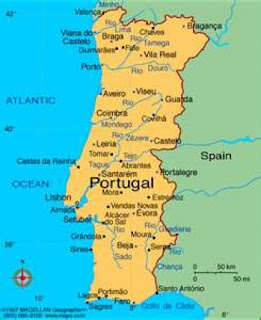The Portuguese of Portugal is called European Portuguese. It is distinct from the other main variety, Brazilian Portuguese. In Portugal there are many accents. However, they can all be divided into northern and southern. The city of Porto is in the north and Lisbon is in the south. Though Lisbon is actually in central Portugal, it is not part of the northern accents and can thus be classified as a southern one.
In the northern accents, the word vinho (wine) is pronounced with [b] instead of [v]. This also occurs in Spanish. In the south, the initial segment is [v].
The word ouro (gold) is pronounced with a diphthong in the north. In the south, however, it is pronounced with a monophthong. The words couro (leather) and coro (choir) are distinct in the north, but not in the south.
Vowel lowering occurs in many parts of the south in words such as bem (well) and coelho (rabbit). This is also true in Lisbon. However, in the north vowel lowering does not occur in these words.
The word roda (wheel) has an intervocalic fricative in the north. The fricative is also used in central Portugal. This is the result of lenition. However, in the south, it is a plosive. The same process occurs in Spanish. This process also occurs with intervocalic [b] and [g] as in lobo (wolf) and lago (lake).
Another difference that distinguishes the accents of the north and south is vowel quality. The vowels tends to be more open in the north. Nasalization is also absent in many northern varieties. The word manhã (morning) has no nasal vowel in many northern varieties. This process is known as denasalization.
All accents of European Portuguese can be classified into two, northern and southern. The accents of central Portugal include those of Lisbon and Coimbra. Though it is usually classified as part of the southern accent, the central accent of Portuguese also lenites the voiced plosives intervocalically.

No comments:
Post a Comment